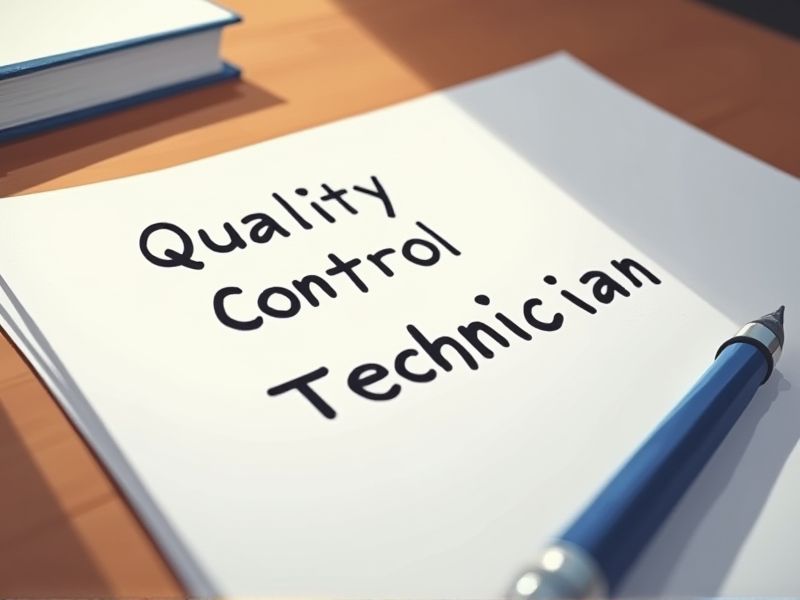
Quality Control Technicians are crucial in maintaining product standards and ensuring regulatory compliance. Certifications validate the technician's expertise in industry-specific protocols and enhance credibility among employers and clients. They also help in keeping technicians updated with the latest technological advancements and methodologies. Here are important certifications you may need as a Quality Control Technician.
ASQ Certified Quality Inspector (CQI)
The ASQ Certified Quality Inspector (CQI) credential enhances a Quality Control Technician's competence by providing a standardized knowledge framework. Obtaining the CQI certification often leads to improved efficiency in detecting and addressing production quality issues. Companies may see a reduction in waste and defects when technicians are certified, as they apply proven methodologies to maintain quality standards. Employees with the CQI designation may access better career opportunities, reflecting a higher level of professionalism and commitment to quality.
ASQ Certified Quality Technician (CQT)
Employers seek ASQ Certified Quality Technicians (CQT) because certification ensures a standardized level of competency in quality control skills. Certification enhances a technician's ability to effectively use statistical methods to monitor and improve product quality. The CQT certification demonstrates a commitment to continuous improvement, which can lead to increased process efficiency. Having certified technicians often correlates with reduced defects and higher customer satisfaction rates, positively impacting the company's reputation.
Certified Quality Improvement Associate (CQIA)
Quality Control Technicians often encounter processes that need optimization for consistent product quality; CQIA training equips them with tools to identify such areas. The CQIA certification imparts a foundational understanding of quality improvement concepts, enabling technicians to implement effective quality management strategies. Certified knowledge in quality improvement techniques helps technicians reduce defects and inefficiencies within production processes. Employers prefer technicians holding a CQIA certification as it reflects a commitment to maintaining high-quality standards and continuous improvement.
Certified Quality Auditor (CQA)
The presence of a Certified Quality Auditor (CQA) ensures that a Quality Control Technician adheres to industry-standard practices and guidelines, enhancing overall product consistency. A Quality Control Technician benefits from CFQ knowledge, leading to more effective identification of process improvements. CQA certification provides a structured framework for auditing processes, crucial for maintaining compliance with regulatory standards. The expertise of a CQA aids in root cause analysis, resulting in more efficient resolution of quality issues faced by Quality Control Technicians.
ISO 9001:2015 Internal Auditor Certification
Obtaining an ISO 9001:2015 Internal Auditor Certification equips a Quality Control Technician with the skills to effectively evaluate compliance with quality management systems. Knowledge from the certification enables technicians to identify inefficiencies and suggest improvements, enhancing overall production quality. Companies experience reduced risk of defects and increased customer satisfaction as technicians ensure adherence to established quality standards. Certification often leads to career advancement and recognition within the industry, motivating technicians to maintain high standards.
Six Sigma Yellow Belt Certification
Gaining a Six Sigma Yellow Belt Certification provides Quality Control Technicians with foundational knowledge to identify inefficiencies and streamline processes. This certification equips them with tools and techniques to effectively participate in quality improvement projects. Understanding Six Sigma principles helps in reducing variability within manufacturing processes, leading to consistent product quality. In a competitive job market, having this certification enhances a technician's skills, making them valuable assets to organizations focused on continuous improvement.
Six Sigma Green Belt Certification
Green Belt Certification in Six Sigma equips Quality Control Technicians with advanced problem-solving skills, which directly improves process efficiency. The certification provides a standardized methodology, allowing technicians to identify defects and reduce variability in manufacturing processes. As companies strive for higher quality standards, having a certified professional ensures effective implementation of quality control measures. This credential often enhances career prospects and can lead to positions with greater responsibility and higher pay.
Lean Six Sigma Certification
Lean Six Sigma Certification equips a Quality Control Technician with skills to identify and reduce process variation effectively. This certification enhances problem-solving abilities, leading to more consistent product quality and fewer defects. Companies often value this certification, as it indicates proficiency in maintaining efficient and cost-effective operations. By implementing Lean Six Sigma principles, technicians help in creating streamlined processes, directly improving overall operational efficiency.
Good Manufacturing Practices (GMP) Certification
Good Manufacturing Practices (GMP) Certification ensures that a Quality Control Technician can adhere to standardized safety and quality protocols, leading to consistent product output. The certification helps in minimizing product recalls and reducing potential health risks, which enhances consumer trust. As regulatory requirements intensify, GMP Certification becomes critical for technicians to demonstrate compliance and maintain industry credibility. Training in GMP fosters a culture of continuous improvement, prompting technicians to identify and resolve quality issues effectively.
Certified Laboratory Technician (CLT) Certification
CLT certification ensures that a Quality Control Technician possesses standardized skills and knowledge essential for maintaining industry quality standards. The certification often leads to improved accuracy in testing results, as technicians are trained in precise methodologies. Having certified technicians reduces errors and enhances the company's credibility, leading to increased trust from clients and stakeholders. Obtaining CLT certification often results in higher career prospects and salary potential, as employers value the assurance of competency.
Summary
When you hire a Quality Control Technician with certifications, their validated expertise directly impacts product quality. Certified technicians typically follow industry standards more effectively, reducing defects and recalls. Their precise skills often lead to improved efficiency in the production process. Enhanced quality control measures can boost consumer trust and potentially elevate brand reputation.
